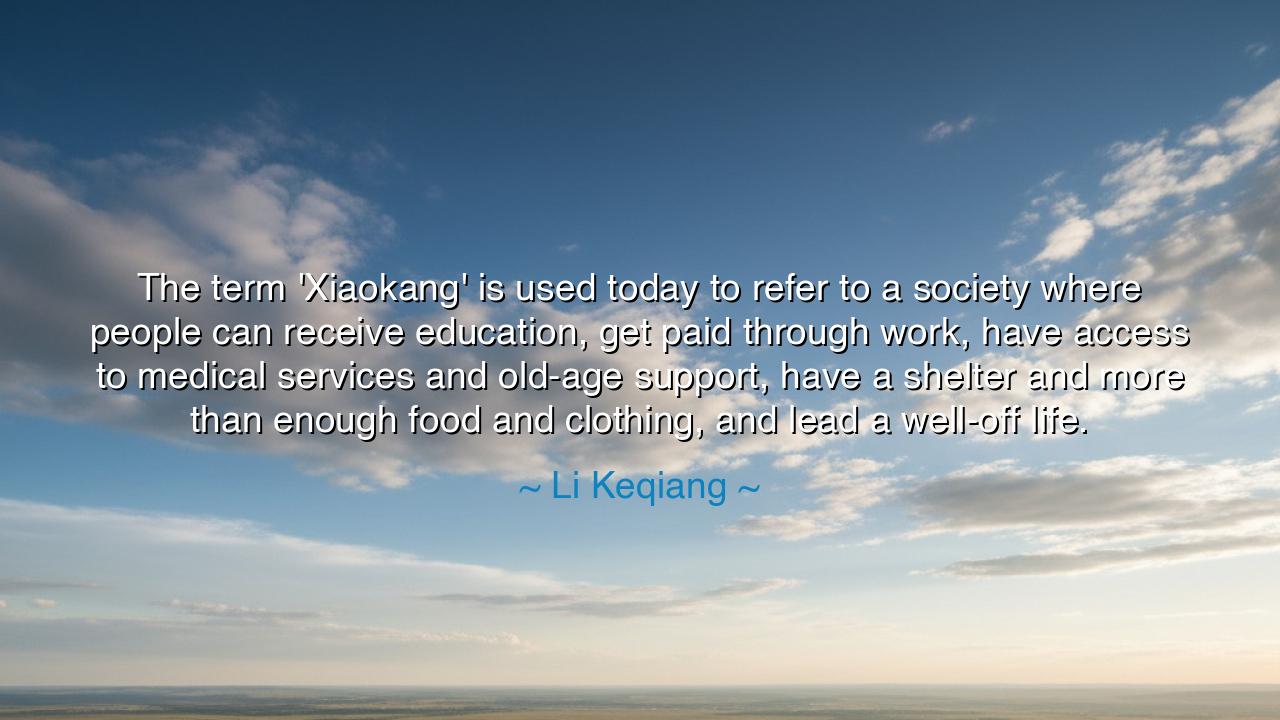
The term 'Xiaokang' is used today to refer to a society where
The term 'Xiaokang' is used today to refer to a society where people can receive education, get paid through work, have access to medical services and old-age support, have a shelter and more than enough food and clothing, and lead a well-off life.






Hear, O seekers of harmony, the words of Li Keqiang, who spake of the ancient dream made modern: “The term ‘Xiaokang’ is used today to refer to a society where people can receive education, get paid through work, have access to medical services and old-age support, have a shelter and more than enough food and clothing, and lead a well-off life.” In this vision is contained not only the prosperity of a nation, but the ancient yearning of humankind: to live in dignity, with sufficiency, with security, and with peace.
The meaning of this utterance rests upon the profound Chinese concept of Xiaokang—a phrase first spoken in the Book of Songs, thousands of years ago, when sages sought to describe a society of modest prosperity, where none were destitute and all had enough. Unlike fleeting riches or the indulgence of a few, Xiaokang envisions balance: the balance of body sustained, mind enriched, family sheltered, and elders honored. It is not excess that is sought, but well-off life, where each may stand upright without shame, and where the nation’s strength is measured not by the wealth of kings, but by the well-being of its people.
Consider, my children, the tale of Emperor Taizong of the Tang Dynasty, who ruled with wisdom and sought the counsel of the great minister Wei Zheng. Under his reign, policies of fairness, education, and reduced taxation brought stability and prosperity to the people. The chronicles remember that fields bore fruit, families prospered, and even distant lands admired the flourishing of China. This was a taste of Xiaokang—not the luxury of the few, but the steady sufficiency of the many. It shows us that the concept is not mere theory, but a goal lived out in the cycles of history.
The origin of Li’s words, spoken in modern times, springs from this ancient seed. In invoking Xiaokang, he called his people to remember their heritage: that the dream of a balanced, prosperous society is not a new invention, but an inheritance from their ancestors. By redefining it for the modern age—education for all, work with fair pay, medical services, old-age support, shelter, food, and clothing—he extended the ancient song into the present, making timeless wisdom speak to modern needs.
Yet let us not mistake Xiaokang for mere material comfort. No, its heart beats with dignity and justice. To provide bread alone is not enough, if the soul is neglected. To build shelter alone is not enough, if the heart knows no peace. Xiaokang means a life of wholeness, where the individual may rise each morning knowing that the basic needs are secure, and that their society will not abandon them in sickness, in age, or in hardship. It is a covenant between people and nation, between rulers and ruled, that prosperity shall not be hoarded, but shared.
The lesson for us is radiant: seek not only wealth, but balance. A society that elevates only the strong and casts aside the weak is doomed to division and decay. But a society that ensures education, sustenance, shelter, and care is like a tree planted by rivers of water—its roots deep, its branches wide, its fruit abundant. In personal life as well, the same balance must be sought: not excess, but sufficiency; not greed, but gratitude; not rivalry, but harmony.
Practical actions lie before you: in your communities, build systems where none are left behind. Give to those who hunger, teach those who thirst for knowledge, honor those who age, and care for those who are ill. In your own life, remember that well-off does not mean lavishness, but the steady abundance that allows peace of mind. And in your nations, call for leaders who, like Li Keqiang, look to Xiaokang—the prosperity of the many, not the indulgence of the few.
Thus, O heirs of tomorrow, let this wisdom guide you: pursue not wealth without end, but the noble sufficiency of Xiaokang. For when each man and woman is clothed, sheltered, nourished, and educated, then the nation is strong, the people are joyful, and the legacy of the ancients is fulfilled. Balance, dignity, sufficiency—this is the well-off life worthy of humankind.






AAdministratorAdministrator
Welcome, honored guests. Please leave a comment, we will respond soon